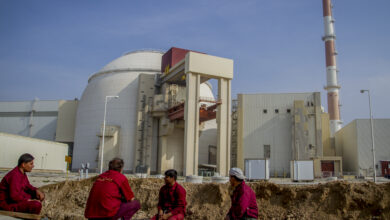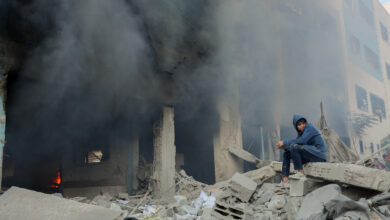US Vows Support for Gaza Truce but No ‘Benefit’ for Hamas
US top diplomat Antony Blinken on Tuesday vowed support to help rebuild the battered Gaza Strip and shore up a truce between Hamas and Israel, but insisted the territory’s Islamist militant rulers would not benefit from any aid.
Blinken’s tour, which started in Israel and will also take him to neighboring Egypt and Jordan, comes as unrest still grips parts of annexed east Jerusalem after Friday’s ceasefire ended 11 days of fighting in and around the Gaza Strip.
At a joint news conference in Jerusalem with Israeli Prime Minister Benjamin Netanyahu ahead of talks with Palestinian president Mahmud Abbas later in the West Bank, Blinken warned that Washington would not allow international aid to rebuild impoverished Gaza to benefit Hamas.
“We’ll work with our partners closely, with all, to ensure that Hamas does not benefit from the reconstruction assistance,” Blinken said.
Netanyahu warned that Israel would respond very strongly if Hamas violated the truce. “If Hamas breaks the calm and attacks Israel, our response will be very powerful,” the Israeli premier said.
Blinken, who said earlier his trip would aim to support “efforts to solidify a ceasefire,” had no contacts with Hamas, which is blacklisted as a terror group by Washington and most other Western governments. “The United States fully supports Israel’s right to defend itself,” he reiterated.
US President Joe Biden said Blinken would meet “with Israeli leaders about our ironclad commitment to Israel’s security,” as well as seeking to rebuild ties with the Palestinians.
Blinken on Sunday reaffirmed US support for a two-state solution as the only way to provide hope to Israelis and Palestinians that they can live “with equal measures of security, of peace and dignity.”
His remarks about “equal measures” for Israelis and Palestinians seemed to shift the tone from Donald Trump‘s administration, which cut aid to the Palestinian Authority and unveiled a Middle East peace plan with strong Israeli backing but no support from Palestinians.
In Jerusalem, Blinken said Israelis and Palestinians faced an uphill struggle to restore trust, after conflict in Gaza and unrest in the West Bank.
“There’s lots of hard work ahead to restore hope, respect, and some trust across the communities,” the US top diplomat said. “But we’ve seen the alternative and I think that should cause all of us to redouble our efforts to preserve the peace and improve the lives of Israelis and Palestinians alike.”
Israeli air strikes and artillery fire on Gaza killed 253 Palestinians, including 66 children, and wounded over 1,900 people in 11 days of conflict from May 10, the health ministry in Gaza says.
Rocket and other fire from Gaza claimed 12 lives in Israel, including one child and an Arab-Israeli teenager, an Israeli soldier, one India national, and two Thai workers, medics say. Some 357 people in Israel were wounded.

Mass Arrests
Blinken’s visit comes as the ceasefire holds but tensions simmer in Israel and the rest of the occupied Palestinian territories.
Hours before Blinken’s arrival, Israeli forces killed a Palestinian in the occupied West Bank, Palestinian and Israeli security sources said. The man was killed during an Israeli arrest raid on Al-Amara refugee camp near Ramallah, the sources said.
In east Jerusalem, Israeli police said an attacker stabbed two young Israeli men on Monday before police shot him dead. The army said one of those wounded was a soldier.
Palestinian news agency WAFA identified the casualty as a 17-year-old Palestinian high school student.
In the night of Sunday to Monday, Israeli forces rounded up 43 Palestinians in the West Bank and East Jerusalem, the Palestinian Prisoners Club said.
Israeli police, who operate in east Jerusalem, said late Sunday that they had arrested 1,550 suspects and had charged 150 over the past two weeks in connection with the “violent events.”
Peace talks have stalled since 2014, including over the status of east Jerusalem and Israeli settlements in the West Bank.
The latest military escalation started after bloody clashes in Jerusalem’s Al-Aqsa mosque compound, Islam’s third holiest site, which is also revered by Jews as the Temple Mount. Israeli forces had moved in on Palestinian worshippers at the site, towards the end of the Muslim holy month of Ramadan. They had also sought to quell protests against the threatened eviction of Palestinian families from homes in the East Jerusalem neighborhood of Sheikh Jarrah to make way for Jewish settlers.












